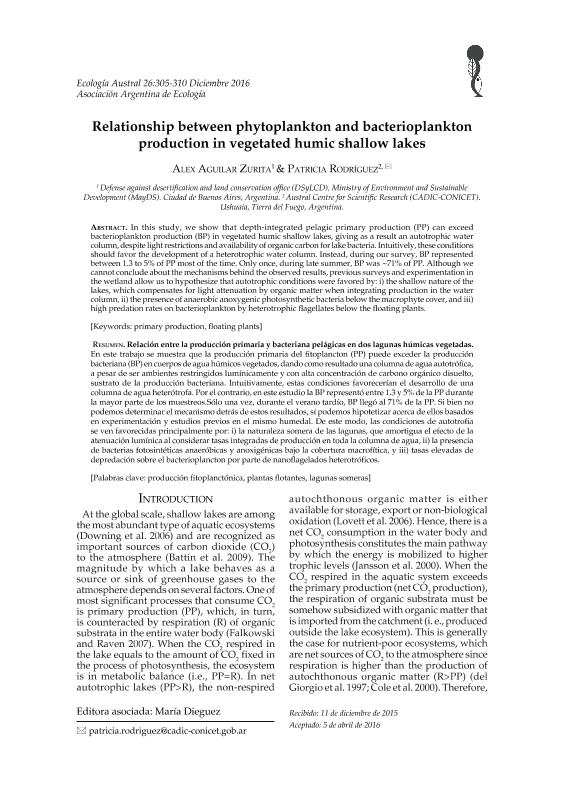Mostrar el registro sencillo del ítem
dc.contributor.author
Aguilar Zurita, Alex Ivan

dc.contributor.author
Rodriguez, Patricia Laura

dc.date.available
2020-01-14T17:58:44Z
dc.date.issued
2016-06
dc.identifier.citation
Aguilar Zurita, Alex Ivan; Rodriguez, Patricia Laura; Relationship between phytoplankton and bacterioplankton production in vegetated humic shallow lakes; Asociación Argentina de Ecología; Ecología Austral; 26; 3; 6-2016; 305-310
dc.identifier.issn
0327-5477
dc.identifier.uri
http://hdl.handle.net/11336/94623
dc.description.abstract
En este trabajo se muestra que la producción primaria del fitoplancton (PP) puede exceder la producción bacteriana (BP) en cuerpos de agua húmicos vegetados, dando como resultado una columna de agua autotrófica, a pesar de ser ambientes restringidos lumínicamente y con alta concentración de carbono orgánico disuelto, sustrato de la producción bacteriana. Intuitivamente, estas condiciones favorecerían el desarrollo de una columna de agua heterótrofa. Por el contrario, en este estudio la BP representó entre 1.3 y 5% de la PP durante la mayor parte de los muestreos.Sólo una vez, durante el verano tardío, BP llegó al 71% de la PP. Si bien no podemos determinar el mecanismo detrás de estos resultados, sí podemos hipotetizar acerca de ellos basados en experimentación y estudios previos en el mismo humedal. De este modo, las condiciones de autotrofia se ven favorecidas principalmente por: i) la naturaleza somera de las lagunas, que amortigua el efecto de la atenuación lumínica al considerar tasas integradas de producción en toda la columna de agua, ii) la presencia de bacterias fotosintéticas anaeróbicas y anoxigénicas bajo la cobertura macrofítica, y iii) tasas elevadas de depredación sobre el bacterioplancton por parte de nanoflagelados heterotróficos
dc.description.abstract
In this study, we show that depth-integrated pelagic primary production (PP) can exceed bacterioplankton production (BP) in vegetated humic shallow lakes, giving as a result an autotrophic water column despite light restrictions and availability of organic carbon for lake bacteria. Intuitively, these conditions should favor the development of a heterotrophic water column. Instead, during our survey, BP represented between 1.3 to 5 % of PP most of the time and once, during late summer, BP was ca. 71 % of PP. Although we cannot conclude about the mechanisms behind the observed results, previous surveys and experimentation in the wetland allow us to hypothesize that autotrophic conditions were favored by, i) the shallow nature of the lakes which compensates for light attenuation by organic matter when integrating production in the water column; ii) the presence of anaerobic anoxygenic photosynthetic bacteria below the macrophyte cover and, iii) high predation rates on bacterioplankton by heterotrophic flagellates below the floating plants.
dc.format
application/pdf
dc.language.iso
eng
dc.publisher
Asociación Argentina de Ecología

dc.rights
info:eu-repo/semantics/openAccess
dc.rights.uri
https://creativecommons.org/licenses/by-nc-sa/2.5/ar/
dc.subject
PHYTOPLANKTON PRODUCTION
dc.subject
BACTERIOPLANKTON PRODUCTION
dc.subject
FLOATING PLANTS
dc.subject
HUMIC LAKES
dc.subject
SHALLOW LAKES
dc.subject.classification
Biología Marina, Limnología

dc.subject.classification
Ciencias Biológicas

dc.subject.classification
CIENCIAS NATURALES Y EXACTAS

dc.title
Relationship between phytoplankton and bacterioplankton production in vegetated humic shallow lakes
dc.title
Relación entre la producción primaria y bacteriana pelágicas en dos lagunas húmicas vegetadas
dc.type
info:eu-repo/semantics/article
dc.type
info:ar-repo/semantics/artículo
dc.type
info:eu-repo/semantics/publishedVersion
dc.date.updated
2020-01-13T14:19:50Z
dc.journal.volume
26
dc.journal.number
3
dc.journal.pagination
305-310
dc.journal.pais
Argentina

dc.journal.ciudad
Buenos Aires
dc.description.fil
Fil: Aguilar Zurita, Alex Ivan. Ministerio de Medioambiente y Desarrollo Sustentable; Argentina
dc.description.fil
Fil: Rodriguez, Patricia Laura. Consejo Nacional de Investigaciones Científicas y Técnicas. Centro Austral de Investigaciones Científicas; Argentina
dc.journal.title
Ecología Austral
dc.relation.alternativeid
info:eu-repo/semantics/altIdentifier/url/http://ojs.ecologiaaustral.com.ar/index.php/Ecologia_Austral/article/view/223
Archivos asociados
